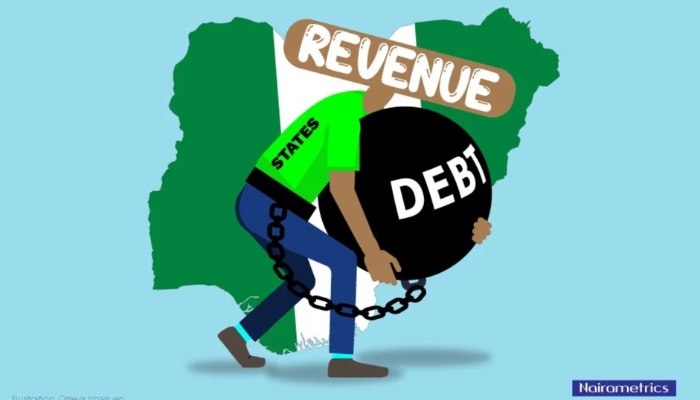Nigeria is currently channeling approximately 50 percent of its national revenue into debt servicing, according to a recent report by a government-appointed presidential advisory panel. The revelation has raised serious concerns about the country’s fiscal sustainability and the implications for development funding and public services.
The panel, composed of fiscal policy experts and senior economic advisers, was tasked with evaluating the nation’s financial health and proposing reforms to improve revenue collection and spending efficiency. Their findings indicate a troubling trend: as debt obligations rise and revenue growth stagnates, Nigeria’s ability to fund infrastructure, education, healthcare, and security becomes increasingly constrained.

The committee’s assessment shows that the federal government’s debt service-to-revenue ratio has consistently hovered around 50 to 60 percent in recent quarters. This means that for every ₦100 earned, more than ₦50 is used to repay debt, leaving very little for actual governance and capital investment. In some previous quarters, this figure climbed even higher, surpassing 70 percent at certain points, especially during periods of high external debt payments and currency devaluation.
At the heart of this issue is Nigeria’s persistent reliance on borrowing, both from domestic and international creditors. With declining oil revenues, slow tax collection, and currency volatility, the country has found itself increasingly dependent on loans to finance its budget. While borrowing can be a tool for development, the current structure appears unsustainable, especially when loans are not tied directly to revenue-generating or productive projects.
The advisory panel’s report warned that the growing proportion of revenue consumed by debt repayments poses a threat to macroeconomic stability. Essential projects are being delayed, and ministries are struggling with budget shortfalls. Even recurrent expenditure like salaries and pension payments are at risk of disruption if the trend continues unchecked.
The report highlighted a worrying scenario where Nigeria could find itself spending more on debt repayments than on all social and economic sectors combined. This development, the panel argued, undermines the country’s capacity to meet the basic needs of its growing population and erodes public trust in the fiscal management system.
In response to the findings, the panel has recommended urgent reforms. Key among them is the need to expand the country’s revenue base through more effective tax administration and elimination of leakages in government earnings. The current tax-to-GDP ratio in Nigeria remains one of the lowest in the world, barely reaching 10 percent. This limits the government’s capacity to generate funds internally and forces it to rely heavily on debt.
Another major recommendation is debt restructuring. The panel proposed renegotiating existing debt terms with lenders to extend repayment periods, reduce interest rates, or convert debt into equity in strategic sectors. It also called for an immediate suspension of new non-essential borrowing until a stronger revenue system is in place.
The panel further emphasized the importance of transparency and accountability. According to the report, a significant part of the debt burden stems from past loans that were either misused or failed to generate any long-term economic impact. A thorough audit of all public debts was proposed to determine which obligations are productive and which are adding unnecessary pressure on public finances.
Additionally, the panel urged the federal government to adopt a zero-based budgeting approach. This method requires that all expenses be justified for each new budget cycle, rather than simply adjusting previous budgets. Such an approach, the panel argued, would help in identifying and cutting down on unnecessary expenditures, thereby freeing up more funds for development.
Meanwhile, reactions from the public and financial analysts have been mixed. While many agree that the government must act swiftly, there is skepticism about the political will to implement such tough reforms, especially in the face of entrenched interests and bureaucratic resistance.
Some experts have also pointed out that the government’s economic plans must be aligned with long-term productivity. Borrowing to fund consumption or political projects, they say, only worsens the debt problem. Instead, funds must be directed toward agriculture, manufacturing, technology, and human capital development—areas that can yield revenue and create employment over time.
Despite the grim outlook, the panel’s report leaves room for optimism. It acknowledged that with bold decisions and effective implementation, Nigeria can gradually reduce its debt burden, increase revenues, and stabilize the economy. It concluded by calling on citizens to demand accountability and support reforms that ensure public funds are used wisely.
In conclusion, the report from the presidential panel serves as a wake-up call. Nigeria’s heavy debt servicing obligation is a symptom of deeper structural weaknesses that require immediate attention. The government must act swiftly and decisively to avoid a full-blown fiscal crisis and restore confidence in its economic management.
Support InfoStride News' Credible Journalism: Only credible journalism can guarantee a fair, accountable and transparent society, including democracy and government. It involves a lot of efforts and money. We need your support. Click here to Donate
